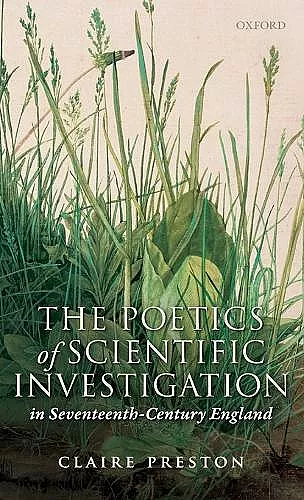The Poetics of Scientific Investigation in Seventeenth-Century England
Format:Hardback
Publisher:Oxford University Press
Published:17th Dec '15
Currently unavailable, and unfortunately no date known when it will be back
This hardback is available in another edition too:
- Paperback£29.49(9780192867032)

Winner of the British Society for Literature and Science Prize for 2015
This study examines the way that scientists in the 16th and 17th centuries, who had not studied 'science' formally, used the tools of their literary education to formulate ideas about science and, at the same time, how the remarkableseventeenth-century scientific developments inspired non-scientific writers to make new fictions of discovery.The writing of science in the period 1580-1700 is artfully, diffidently, carelessly, boldly, and above all self-consciously literary. The Poetics of Scientific Investigation in Seventeenth-Century English Literature considers the literary textures of science writing -- its rhetorical figures, neologisms, its uses of parody, romance, and various kinds of verse. The experimental and social practices of science are examined through literary representations of the laboratory, of collaborative retirement, of virtual, epistolary conversation, and of an imagined paradise of investigative fellowship and learning. Claire Preston argues that the rhetorical, generic, and formal qualities of scientific writing are also the intellectual processes of early-modern science itself. How was science to be written in this period? That question, which piqued natural philosophers who were searching for apt conventions of scientific language and report, was initially resolved by the humanist rhetorical and generic skills in which they were already highly trained. At the same time non-scientific writers, enthralled by the developments of science, were quick to deploy ideas and images from astronomy, optics, chemistry, biology, and medical practices. Practising scientists and inspired laymen or quasi-scientists produced new, adjusted, or hybrid literary forms, often collapsing the distinction between the factual and the imaginative, between the rhetorically ornate and the plain. Early-modern science and its literary vehicles are frequently indistinguishable, scientific practice and scientific expression mutually involved. Among the major writers discussed are Montaigne, Bacon, Donne, Browne, Lovelace, Boyle, Sprat, Oldenburg, Evelyn, Cowley, and Dryden.
It is no wonder that Claire Preston's scrupulously well-researched The Poetics of Scientific Investigation in Seventeenth-Century England is such a pleasure to read. ... ... Inspired by Enlightenment reason and Brownian fecundity alike, Preston's study does right by both the early modern era and our own. * Wendy Beth Hyman, Renaissance Quarterly *
Preston's argument marries rhetorical elegance with the patterned clarity of the quincunxes admired by [Thomas] Browne. * Studies in English Literature: 1500-1900 *
The book asks not a new question but an important one: what do or can science and the humanities say to each other, what do they have in common? * Clio Doyle, Los Angeles Review of Books *
This book offers an important framework for understanding the variety of intersecting and dialogic interactions between natural history and imaginative writing during the early modern period and beyond. * George E. Haggerty, SEL Studies in English Literature 1500-1900 *
Claire Preston's book is a stimulating and wide-ranging analysis of the nexus between science and literature in the age of the putative English scientific revolution. * Robert J. Mayhew, Journal of Historical Geography *
- Winner of Shortlisted for the British Society for Literature and Science Prize for 2015.
ISBN: 9780198704805
Dimensions: 222mm x 149mm x 23mm
Weight: 490g
310 pages